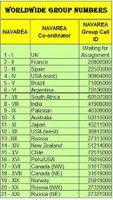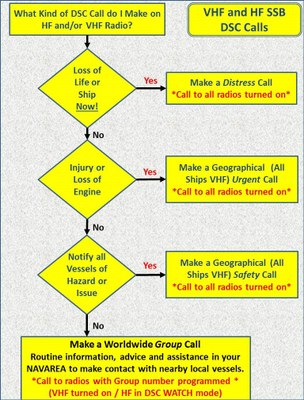Increasing Safety at Sea for Cruisers: Worldwide DSC calling strategy for recreational vessels
Realising there were countless cruisers who were not utilising the DSC capabilities of modern marine radios, Alan Riches of Brunei Radio and Terry Sparkes of ‘made simple for cruisers’ have developed a list of global group numbers which cruisers can use wherever they are in the world and share the same channel for weather alerts or when help is needed.
Published 9 years ago, updated 6 years ago
HF/SSB radio services

NAVAREA Group Calling Network
A worldwide, mutual support, DSC calling strategy, for recreational vessels.
This strategy for DSC Group Calling amongst recreational vessels in a NAVAREA region utilises the DSC capabilities of modern marine radios – VHF and HF/SSB – to create a quick response mutual support network.
Group Calling is an established and recommended function of modern DSC capable VHF and HF/SSB marine radios. Group participants simply enter the group call ID into the Group Address Book of their radio. The radio then maintains a constant receive watch for that Group ID. Radios can monitor for multiple group IDs; some up to 100. This allows groups of boats – eg: boat club members, fishing competition participants, yacht race or rally participants, cruising support group, charter yacht fleets, dive or surf charter boats etc – to make immediate DSC initiated contact with any radios in their group which are switched on and in range of the frequency used to initiate the call.
This NAVAREA Group Calling Network is designed to initiate DSC contact with what could be all/any recreational vessels (known or unknown) in range for Non-Distress purposes; if all boats have a DSC capable VHF and/or HF/SSB radio with the local NAVAREA Group Call ID entered and the radio switched on. In HF/SSB radios this system utilises the General Group Calling function built into these DSC radios to more reliably (than voice call) alert nearby vessels to ask for advice, local information, or help. It will work for recreational vessels in large ocean areas, exploring island chains or unfamiliar coastlines when they need to contact a vessel nearby – either an unknown local based vessel or another unknown cruiser – to get advice or assistance.
Vessels need to be in DSC WATCH mode to receive individual and group calls for HF SSB. VHF radio just needs to be turned on.
Cruisers should keep the M802 in DSC Watch Mode to receive calls. Be sure your DSC Watch Mode is scanning simplex. See procedure “DSC to Simplex for Cruisers” to expand HF DSC calling capability for calling and receiving calls on all 6 frequencies – http://www.made-simplefor-cruisers.com/-%20ICM802/Appendix%20XI%20DSC%20calling%20upgrade%20for%20Cruisers.pdf
It creates the widest range/most boats DSC Group Call in a tiered DSC Calling system.
For example, a boat in an event/race/rally needing advice/assistance might first make an Individual DSC call to a specific boat or to the event/race/rally control using their individual DSC IDs. If that does not get a suitable response, then DSC calls the Group Call DSC ID of their event boats (perhaps 10 to 100 boats). If that does not get a useful response, then try a bigger/broader group such as the Group Call DSC ID of all the boats in their club (perhaps 100 to 300 possible boats) which might be nearby. If that is unsuccessful, send a NAVAREA Group ID call; which should alert any similarly equipped nearby boats (perhaps many hundreds of possible boats) in range.


But timely support, advice, spare parts, fuel or a tow, from another nearby mariner could prevent a problem situation, or stop a problem growing into a Distress situation. A DSC Distress call will alert ALL similar marine radios – commercial, recreational, oil and gas platform, man-of-war, ferry, tugs etc – in range with their radios turned on.
This NAVAREA Group Call Network is based on NAVAREA regions.
These existing 21 worldwide maritime regions are used to define S&R responsibility areas, and also define the responsibility areas for creating METAREA forecasts and MSI (Maritime Safety Information) warnings (eg: drifting logs, abandoned vessels, a seismic vessel with a 5nm long cable, etc.).
See this map of NAVAREAs of the world:
https://www.iho.int/mtg_docs/com_wg/CPRNW/CPRNW_Misc/RNW_on_the_web.htm
See this website for METAREA forecasts of the world:
http://weather.gmdss.org/metareas.html
See this website page for links to MSI (Maritime Safety Information) warnings:
http://weather.gmdss.org/navareas.html
METAREA forecasts are the important open sea weather and weather warning predictions prepared by a human – not solely a machine – by examining and interpreting the information collected and presented by machines. METAREA forecasts are available for free download – via HF/SSB radio email – by members of the not-for-profit SailMail Association.
MSI warnings are updated daily to provide mariners with safety-related information such as navigation lights not working, abandoned vessels, logs or containers fallen off ships in bad weather, military firing exercises or other hazards to navigation, including cable laying or survey ships towing 5nm cables.
Effective instant communication and prompt mutual support network is created in a NAVAREA by all recreational vessels in that region entering that region’s Group Call ID (see below) in their radio/s, and maintaining their DSC Capable VHF and/or HF/SSB radios in constant (silent) watch when on-board. All vessels – regardless of their other Group Call IDs – eg: club, race or rally, fishing contest, dive boat or charter fleet etc – will go into an alert state when they receive the NAVAREA Group Call ID.
For example, boats coastal cruising or island hopping can use the NAVAREA Group Call ID to DSC call any nearby boats and then ask by voice for local boats which can help with information on fuel supplies, check-in procedures, waypoints to get into anchorages, etc. And boats at sea can contact any others nearby using the NAVAREA Group Call ID to warn them of hazards (shipping containers, abandoned vessels etc), or request advice with a engine breakdown, a tow, spare part, fuel, dinner recipe etc. This works for VHF and HF/SSB marine radios.
For further details from Brunei Bay Radio (including reports from cruisers who have utilised these capabilities, for example when crossing the Indian Ocean), go to http://www.bruneibay.net/bbradio/bbrNAVAREAgroupIDs.htm
Terry Sparks has also been instrumental in promoting this mutual support programme – http://www.made-simplefor-cruisers.com/
The more that yacht crews utilise their DSC capable HF/SSB and VHF radios for general calling – asking advice and all the other routine, domestic and boat operation communication – the more confident and effective will be their use of this critical communications resource in the event of a problem. Either if asking for help, or responding to a call for help from another mariner, or an MRCC.
Any cruisers having issues getting started with DSC Calling can contact Terry at
p-t_on_sunyside@live.com
Related to the following Cruising Resources: Communications, Communications Equipment, Cruising Information, Equipment, General, General Services, Piracy & Security, Safety, Safety and Medical, Services and Equipment



